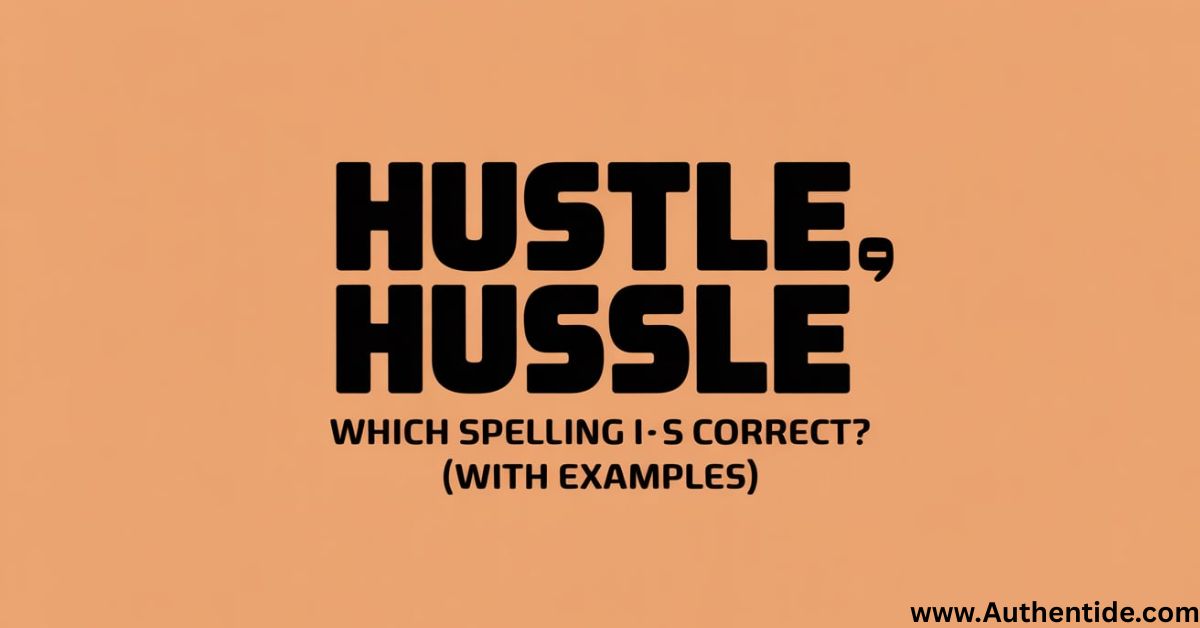Hustle or Hussle: Which Spelling Is Correct? Right at the top, you see your focus keyword. That grabs attention, doesn’t it? It hints at confusion, controversy—something worth diving into.
In today’s world, everyone seems to be talking about the hustle culture—people working late nights, sending emails to “Alex” at 2 a.m., chasing success. Yet when they type that word, many pause: is it hustle? Or is it spelled hussle? This article cuts through the fog. You’ll get clarity on hustle or hustle meaning, a look at hustle vs hustle, and practical grammar tips so you never wonder again.
You’ll also see engaging scenario examples—say, writing an email to Jane about her side gig or critiquing your friend Sam’s career strategy. Along the way, the content uses keywords like hustle meaning, correct spelling of hustle, and is hustle a word, so you understand not just the spelling but the nuance.
(in Introduction)
Hustle or Hussle feels small—just one letter difference—but it can spell embarrassment if you’re mixing it up in a job application or a blog post. When you write “hussle,” spell‑check might not catch it. Yet readers see it and think: that’s not right. In this article, you’ll learn definitively which is correct: hustle spelling, hussle meaning, and how the two differ. You’ll stop second‑guessing yourself—and start writing with confidence about hustle meaning and correct English usage.
Why Is There Confusion?
Many writers stumble over hustle vs hustle, mixing up homophones or misremembering which spelling aligns with the meaning. It’s a classic common spelling mistake, fueled by phonetic assumptions. People hear the short “uh” sound and guess “hussle.” Yet English doesn’t work that way. Spelling errors in English often happen when pronunciation misleads.
How to Spell Hustle – Is Hussle a Word
Let’s get straight to grammar: the correct spelling is hustle. You spell it H‑U‑S‑T‑L‑E. “Hussle” doesn’t appear in any reputable English dictionary. That means is hustle a word? No—it’s not. It’s simply a misspelled word. So when someone asks which is correct, hustle or hussle, the answer is clear: hustle.
Hustle Meaning and Hustle Definition
When you define hustle, you describe energy, initiative, and drive. It can mean working hard, even aggressively, to get results. Or it can mean a swindle, like a scam. That’s the hustle definition. So whether you’re encouraging someone to hustle (positive) or warning them to avoid a hustle (negative), you’ll use that same correct spelling.
Hussle Meaning – Does It Mean Anything
Because the meaning doesn’t exist, writers looking up “hussle or hustle meaning” often find nothing. English spelling rules simply don’t recognize it. When you search for hustle, you’ll hit dead ends—no credible definitions, no grammar guides, no reputable usage.
H2: Hustle vs Hussle – The Clear Differences
| Word | Definition | Dictionary Status |
|---|---|---|
| hustle | To work energetically; to swindle | ✅ Recognized (Oxford, Merriam‑Webster) |
| hussle | — | ❌ Not recognized |
Whenever people ask hussle or hustle, you should guide them to “hustle.” It’s the only valid option. Some might think it’s a regional variant or slang, but it’s not.
Scenario Examples

Email Example (Correct Usage)
To: lisa@example.com
Subject: Early Morning Side Gig Plans
Hi Lisa,
I wanted to give you an update on my side hustle. I’ve started a freelance design project and plan to hustle hard in the evenings to finish it by Friday. Let me know your thoughts.
Thanks,
Sam
Here “hustle” correctly shows ambition and effort. You could insert the keyword hustle spelling by adding a brief note: “By the way, when you write hustle, always remember it’s spelled with one ‘s’—that little detail matters if you ever mention hussle or hustle confusion to clients!”
Email Example (Incorrect Usage)
To: jane@example.com
Subject: My New Side Project
Hi Jane,
I recently started a side project and I’ll be going through the hussle of marketing it myself. Wish me luck!
Cheers,
Alex
In this example, the writer uses “hussle,” which is wrong. It undermines credibility. If someone asked for a hustle vs hustle comparison, you’d point out this is a common spelling mistake that’s easily fixed.
Pro Tips on the Most Important Paragraph

Pro Tip: Memorize that “hustle” is always spelled H-U‑S-T‑L‑E. Whenever you question it, mentally break the word into “hustle” not “huss‑le.” Use that trick as a spelling anchor.
- Tip 1: Think of hustle pronunciation—the “stl” cluster hints at correct spelling.
- Tip 2: If a spell‑checker flags “hussle,” correct it automatically—don’t overthink.
- Tip 3: Teach the rule to someone else—like your friend Mia—because explaining it cements it for you.
That paragraph is the cornerstone: you nail the correct form, the mnemonic, and the practical fix strategy in one go.
Synonyms and Usage Tips (Bonus Section)
You might wonder: what about other commonly confused words? Here’s how “hustle” compares:
- synonyms: scurry, bustle, push, grind
- usage tip: Pair hustle with verbs like “to hustle up,” “hustle through,” or nouns like “side hustle,” “daily hustle.”
That helps if you’re writing more content around vocabulary confusion or word usage in writing.
A Final Look at Hustle or Hussle

To wrap up: if you ever ask yourself which is correct, hustle or hussle, remember this—hustle is correct, hussle is not, and learning that one rule prevents a lot of embarrassment in written communication. Whether you’re writing resumes, emails, blogs, or social media posts, using hustle meaning accurately shows you know your English spelling. For extra polish, keep exploring grammar tips, pay attention to homophones in English, and build awareness of spelling and grammar guide principles.
Summary
- hustle spelling: always hustle, never hussle
- hussle meaning: no meaning
- hustle definition: to work hard or to con someone
- Always use the mnemonic tied to hustle pronunciation
- Avoid the common spelling mistake of doubling the “s”
- That pro tip paragraph gives you the memory tool and strategy to fix errors

Your go-to place for smart synonyms and celebrity updates. Muhammad Hassan Abid is dedicated to creating useful, engaging content that informs, inspires, and truly serves your curiosity

